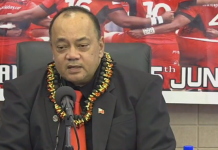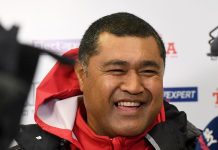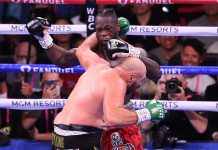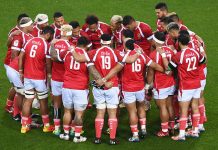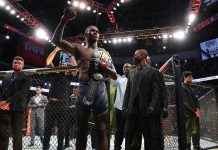Another busy year has come to an end for the southern hemisphere and in terms of Oceania Rugby there was much to cheer. New Zealand’s Fifteens side led the way with an amazing, perfect season of 14 matches and 14 wins while the national Sevens teams – men’s and women’s – took the Rugby World Cup Sevens title in Moscow.
The IRB World Rankings in December had New Zealand at one, Australia at three, Samoa eighth, Fiji 11th and Tonga 12th. Once again that is five teams in the top dozen teams of world Rugby.
The year had a particularly Pacific end to it in November with Australia downing Wales in Cardiff and Fiji celebrating its centenary by playing the Barbarians at Twickenham, while its Sevens team won the HSBC Sevens World Series tournament in Dubai.
The performances of the Pacific Island nations of Fiji, Samoa and Tonga at Test level were again highly promising and showed that the IRB funding programme to FORU (Federation Oceania Rugby Unions) is continuing to strengthen playing depth. This was highlighted by some very credible performances against senior top tier teams.
Samoa, in particular, enjoyed victories over Scotland and Italy this year and pushed South Africa hard in June during a tournament staged between the four nations in SA. Later in the year in Europe, they lost 15-16 to Georgia and also played Ireland in Dublin during the November Test series but an under-strength team was defeated by the locals 40-9.
Flying Fijians were crowned PNC champions
Fiji beat Japan, USA and Tonga in June to win the Pacific Nations Cup (PNC) for the first time ahead of Canada in Samoa’s absence. In November, the Fijians also beat Portugal in Lisbon and Romania in Bucharest and, but for some ill-discipline, should have beaten Italy at Cremona.
Tonga finished third in the PNC, also beating Japan and USA, and showed in November through spirited performances against Romania (lost 18-19) and European heavyweights France and Wales that it is building nicely for a competitive showing at Rugby World Cup 2015 in England.
Regular exposure to top-class international action via the IRB match schedule and tournaments such as the PNC continues to be important for the Pacific Islands, not only to gauge their progress and improvement but to ultimately ensure such high quality matches provide the ultimate test for developing talent that is emerging from IRB-sponsored pathway tournaments such as the Pacific Rugby Cup (PRC).
This year, the PRC saw Fiji Warriors, Samoa A, Tonga and Junior Japan compete against various Super Rugby development teams in two rounds, firstly in Sydney and then in New Zealand. The Australian and New Zealand Super Rugby development teams proved to be tough opposition but the Fiji Warriors, who won two and drew two of their six matches, proved to be the best of the Pacific teams.
IRB strategic investment intitiatives
The third round that would have seen the four teams compete directly against each other was postponed. With the expanded November competition calendar for the Pacific Island Unions aimed at boosting performance at Test level, the Unions and the IRB determined that IRB funding and support would be best invested in high performance, logistical and administrative support around the November 2013 Test match programme.
All of this activity and success is largely down to the IRB’s strategic investment initiatives that continue to target Oceania as a priority development region.
IRB Chief Executive Brett Gosper said at the FORU annual meeting: “Between 2009 and 2012 the IRB invested nearly GBP16million in Pacific Islands rugby and, in 2013, we invested a further GBP4.65million through development, regional tournaments and high-performance programmes. This funding is aimed at raising performances and providing the necessary infrastructure and support to continue to compete at the highest level.”
Within the high-performance programme, the investment allowed FORU to continue the roll-out of important educational and training courses in 2013 across its membership. This included a medical super-week delivering education courses in Australia, regional strength and conditioning courses in Fiji, an educator and trainer super week in September in Fiji, and regional level three match official courses and level two match official coach courses.
While development funding continues from the IRB to underwrite tournaments, player pathways and high performance programmes, the importance of strong Union governance and professional administration is another important aspect of Pacific Rugby that the IRB is assisting in developing.
Important step with formation of PIPA
Many people also criticise the ongoing export of Pacific Island players to Europe in particular. However there are powerful socio-economic factors at play and Australia and New Zealand are also now finding the lure of the European cheque books is attracting players away from Super Rugby. One important move this year has been the formation of the Pacific Islands Player Association (PIPA) that is now working with the NZ Players Association and the International Players Union on important player issues such as welfare, eligibility and professional contracts.
Currently, according to the Unions and PIPA, there are 632 players eligible to play at Test level for the island nations. Of them, 272 play Rugby overseas. But only 198 of these are now available to play for Samoa, Tonga or Fiji. That means 74 players have qualified to play for rival nations. This is something PIPA would like to address moving forward but it is not an issue just related to the Pacific Islands in the world of professional rugby.
The Pacific Island Unions continue to excel at Sevens with Fiji and Samoa established as core teams in the IRB Sevens World Series. Fiji finished third in the 2012-13 HSBC Sevens World Series. In Moscow in June, Fiji finished third behind NZ and England in the Rugby World Cup Sevens while Samoa won the plate final.
The 2013 Oceania Sevens was played in Fiji and saw the hosts joined by American Samoa, Australia, Cook Islands, PNG, Samoa, Solomon Islands and Tuvalu. The tournament served as a qualifier for places in the HSBC Sevens World Series 2014.
Fiji v Cook Islands in RWC 2015 qualifier
Last year’s runners-up, Samoa, took the title by beating hosts Fiji in the final who were playing under new coach Ben Ryan, formerly head Sevens coach with England. In Tonga’s absence there was the chance for two of the other non-core series teams to qualify for the Hong Kong tournament in 2014. The Cook Islands and American Samoa finished fourth and fifth to earn their places in Hong Kong.
2014 will also feature the final Oceania qualifying stage for RWC 2015. Samoa and Tonga have already qualified for RWC 2015 thanks to their performances at the last tournament in New Zealand. However, the Oceania One qualification place will see Fiji play Cook Islands for the final regional spot. The Cook Islands won the Oceania Cup this year after beating Solomon Islands, Tahiti and closest rivals Papua New Guinea.
It is a big challenge for the Cook Islands, who have yet to make the finals of the tournament. It lost home and away to Tonga in final qualifying to Tonga in 2007. Fiji has played at every Rugby World Cup except 1995, and in 1987 and 2007 they reached the quarter-finals. The Oceania One qualifying place means that FORU will have five teams at the finals in England.
SOURCE: irb.com

